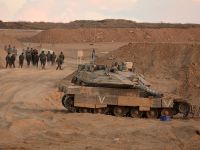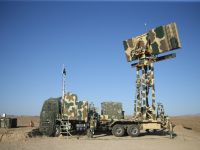US President Bill Clinton and his aides stepped up contact with Middle East and European leaders Saturday as mounting violence in the Middle East threatened to spin out of control.
The United States is "very, very concerned" by the situation in the Middle East and hopes "to do everything we can to prevent an escalation" of violence there, White House spokesman P.J. Crowley said Saturday.
"If the violence doesn't stop, there is always the danger it can spiral into a much more difficult situation," Crowley told AFP.
The US president, who canceled campaign stops due to the developments in the Middle East, "has been engaged for virtually the entire day in helping to try to defuse the situation," the spokesman added.
Crowley specified that Clinton spoke three times with Israeli Prime Minister Ehud Barak, twice with Palestinian leader Yasser Arafat and once with Egyptian President Hosni Mubarak over the course of the day.
The conversations centered on ending the violence, the capture of three Israeli soldiers by Hizbollah guerrillas, and crafting a UN Security Council resolution "helpful to the situation and acceptable to both sides," Crowley said.
The United States abstained Saturday as the UN Security Council adopted a resolution condemning "the excessive use of force" against Palestinians in clashes with Israeli forces.
The resolution was adopted 14-0 after two late-night sittings during which the text was gradually watered down under the threat of a US veto.
The US ambassador to the United Nations, Richard Holbrooke, described the resolution as "one-sided" and "at variance with the totality of the facts," noting that it did not mention Israeli casualties.
Holbrooke also said the resolution gave the false impression that the violence in Jerusalem and the West Bank was spontaneous.
Earlier Saturday, three Israeli soldiers were captured by Islamist Hizbollah guerrillas on the Israeli-Lebanese border.
Israeli Prime Minister Ehud Barak warned Lebanon and Syria they shared responsibility with Hizbollah for the safety of the three men.
He also warned Palestinian leader Yasser Arafat that unless the violence stopped within 48 hours, "we will consider that a halt to the (peace) negotiations."
Asked about Barak's ultimatum, Crowley said: "We are doing everything we can to work with both sides to see an end of violence, defuse the situation and help both sides bridge back to a point where we can once again focus on the peace process."
Meanwhile, Secretary of State Madeleine Albright discussed the crisis with Syrian Foreign Minister Farouk al-Shara and Lebanese President Emile Lahoud.
She also spoke to her counterparts Hubert Vedrine of France and Josep Pique of Spain, according to State Department spokesmen.
Albright called on the French government to lean on Iran and ask it to rein in the Hizbollah.
The US State Department also reminded the Israeli and Palestinian leaders of "commitments" made in Paris last week to do everything possible to restore calm in the region.
And in a statement, the department recommended that US citizens in the region minimize all non-essential activities. "Employees of our embassies and consulates in the region have been told to do the same," it said.
Another top US official, Defense Secretary William Cohen, called for a ceasefire in the Middle East, warning that violence could otherwise spin out of control.
"There has to be a ceasefire that occurs in the Middle East right now so that the parties can get back to the negotiating table," Cohen said during a press conference in Tunisia, where he is on a short visit.
"Otherwise, if this continues, the violence will continue to spiral out of control with more destruction and more death. None of us want to see that take place," added Cohen.
After more than a week of fighting between Israeli troops and Palestinians in the West Bank and Gaza Strip, more than 90 people -- the majority Palestinians and Israeli-Arabs -- have been killed.
In the past 12 months, Clinton -- hoping to oversee a Middle East peace pact before he leaves the White House in January -- has hosted peace talks in Washington between Israel and Syria, then Israel and the Palestinians, but so far his efforts have failed – WASHINGTON (AFP)
© 2000 Al Bawaba (www.albawaba.com)







